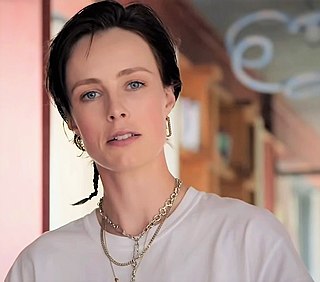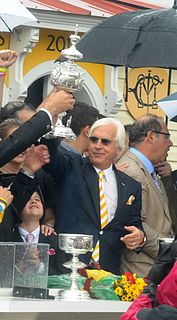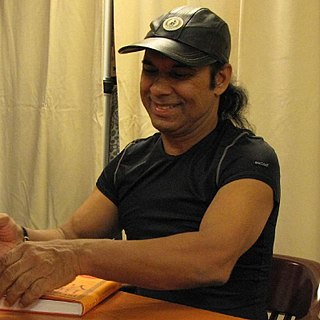A Quote by Jeremy Irvine
If a horse doesn't want to do something, you're not going to make him do it. They're incredibly powerful animals.
Related Quotes
Horses are consistent and logical. The horse will do what is easiest for him. If you make it easy for him to buck you off, kick you, and run away, that’s just what he’s going to do. And more power to him. But if you make it easy for the horse to be relaxed and calm and accurate — and also have it be a beautiful dance between you and the horse — it won’t be too long before he’ll be hunting for that just as hard as you are. Whatever you make easy for the horse, that’s what he’s going to get good at.
My view is that our minds are incredibly powerful animals that are, during life, kept somewhat in check by the load of our bodies. Once that load is gone (or so some ancient texts teach us) the mind is like a horse off the tether. So the habits we get into here might have something to do with what happens to us afterwards. An exciting but harrowing idea, given the everyday state of my mind. But also hopeful, since that's something a person can work with.
Some guys make their careers off one horse; kind of a trick horse, a wonder horse. I'm not knocking that, but for me I'm trying to get better and study. That means taking out new horses. It's a life study. When I've finished a horse, I turn him out and basically stop riding him, except taking him to the occasional branding so I can enjoy him.
The average American is just like the child in the family. You give him some responsibility and he is going to amount to something. He is going to do something. If, on the other hand, you make him completely dependent and pamper him and cater to him too much, you are going to make him soft, spoiled and eventually a very weak individual.
It's very good for you, riding. Every model is like, "I do yoga." I find horses have the same effect, in that you have to put your ego aside and concentrate on making the horse do the things you want it to do, and move in the way you want it to move. So you have to use your body to help this horse do incredibly difficult movements that don't come naturally to it. And if something goes wrong, it's not the horse's fault; it's always your fault. So you have to be quite levelheaded. And then the whole nature aspect of it is very calming.
My horse needs to be quiet enough not to draw my attention. You want your horse always aware of you. Be aware of your horse! Fidgeting? Direct that! Think of it as a gift. Do something with that energy; redirect it or it will be a negative. Don't let your horse check-out. A horse wants peace. Trade movement for peace.
There is a story in Zen circles about a man and a horse. The horse is galloping quickly, and it appears that the man on the horse is going somewhere important. Another man standing alongside the road, shouts, «Where are you going?» and the first man replies, «I don't know! Ask the horse!» This is also our story. We are riding a horse, and we don't know where we are going and we can't stop. The horse is our habit energy pulling us along, and we are powerless.
Think of the horse as your partner.and it's all one great dance.
That's not to say it's always going to be easy or you won't have to work through issues.
But when a horse is troubled or uncomfortable in our world, rather than show contempt for him, you must demonstrate empathy and work to convince him that you mean him no harm.
You have some things that you'd like him to do 'with you', as opposed to 'for you'- and the best way to do that is as partners.
As a rider, you must slowly and methodically show your horse what is appropriate. You also have to discourage what's inappropriate, not by making the inappropriate impossible, but by making it difficult so that the horse himself chooses appropriate behavior. You can't choose it for him; you can only make it difficult for him to make the wrong choices. If, however, you make it impossible for him to make the wrong choices, you're making war.
In order to be able to make and keep commitments... to enduring, intimate relationships... you need to be a certain kind of person. You need to be a powerful person. Powerful people take responsibility for their lives and choices. Powerful people choose who they want to be with, what they are going to pursue in life, and how they are going to go after it.






























